Russia–South Africa relations
Russia–South Africa relations (Russian: Российско-южноафриканские отношения) are foreign relations between Russia and South Africa. Full diplomatic relations were established between both countries on February 28, 1992. Russia has an embassy in Pretoria and a consulate-general in Cape Town. South Africa has an embassy in Moscow. Both countries are also members of BRICS.
 | |
Russia |
South Africa |
|---|---|
History
In 1896, the Transvaal Republic established diplomatic relations with Russia.[1] The Boer war was extensively covered by the Russian media and numerous books, articles, plays, pamphlets and poems were published about the war, usually with a pronounced pro-Boer slant.[2] One Russian writer complained: "Wherever you go these days you hear the same story – the Boers, the Boers and only the Boers".[3] The national anthem of the Transvaal Transvaal, Transvaal, My Country was frequently played by Russian orchestras, numerous committees were founded to collect money for the Transvaal, and church services offered up prayers for a British defeat.[4] In countless newspaper serials and novels, the men of the kommandos were portrayed as heroes battling the arrogant British.[5] Such was the popular enthusiasm that inns, restaurants, and cafés were given Afrikaans names and redecorated in the "Boar style" to improve business.[6] The British historian R.W. Johnson wrote: "Russian conservatives were pro-Boer not only for the usual nationalist, anti-British reasons but because they thought the Boers were like the best sort of Russians – conservative, rural, Christian folk resisting the invasion of their land by foreign (especially Jewish) capitalists."[7] One Moscow newspaper in an editorial stated: "The deep historical meaning of this war is that faith, patriotism . . . the patriarchal family, primordial tribal unity, iron discipline and the complete lack of so-called modern civilisation have . . . become such an invincible force that even the seemingly invincible British have begun to tremble."[8] However, through several hundred Russians did make their way to fight for the Transvaal, upon arriving they were often shocked by the corruption of the Transvaal government, its disorganized ways, and the casual brutality of the Afrikaners towards blacks.[9]
The Soviet Union withdrew its Ambassador after the Sharpeville Massacre in 1960. After South Africa became a republic in 1961, relations were very cold. South Africa considered the Soviet Union an enemy because it financially and militarily supported communism on the African continent. During the South African Border War, the Soviets supplied and trained SWAPO and MPLA fighters. However, by the late 1980s, Russian interference in Africa minimized and relations between the two slightly warmed as the Cold War was ending. Directly after the collapse of the Soviet Union, South Africa and the new Russian Federation established diplomatic relations.
References
- Johnson, R.W. (16 July 1998). "Rogue's Paradise". London Review of Books. Retrieved 2018-11-12.
- Johnson, R.W. (16 July 1998). "Rogue's Paradise". London Review of Books. Retrieved 2018-11-12.
- Johnson, R.W. (16 July 1998). "Rogue's Paradise". London Review of Books. Retrieved 2018-11-12.
- Johnson, R.W. (16 July 1998). "Rogue's Paradise". London Review of Books. Retrieved 2018-11-12.
- Johnson, R.W. (16 July 1998). "Rogue's Paradise". London Review of Books. Retrieved 2018-11-12.
- Johnson, R.W. (16 July 1998). "Rogue's Paradise". London Review of Books. Retrieved 2018-11-12.
- Johnson, R.W. (16 July 1998). "Rogue's Paradise". London Review of Books. Retrieved 2018-11-12.
- Johnson, R.W. (16 July 1998). "Rogue's Paradise". London Review of Books. Retrieved 2018-11-12.
- Johnson, R.W. (16 July 1998). "Rogue's Paradise". London Review of Books. Retrieved 2018-11-12.
External links
| Wikimedia Commons has media related to Relations of Russia and South Africa. |
